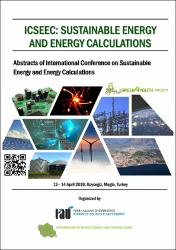| dc.description.abstract | The risky limits of fossil fuel reserves are rapidly increasing the importance of energy in sustainable development. Global energy consumption is expected to increase by 28% by 2040. High economic growth rates of developing countries increase their energy consumption. The changing geographical and economic balances in energy reveal the necessity of long-term solutions to energy markets. Energy policies, green energy and new technologies are emerging as priority issues in the energy market. In the case of predictions, renewable energy will stand out as the fastest growing energy source in the world. Renewable energy sources accounted for nearly 20% of global energy consumption at the beginning of the 21st century, largely from traditional uses of biomass such as wood for heating. Despite this increase in renewable energy sources, coal, oil and natural gas are expected to maintain their position as main energy sources by 2040 and 77% of global energy consumption will still be provided from fossil fuels in 2040. It is expected that natural gas will be the fastest growing energy type among fossil fuels. In 2018, over 33% of global energy consumption comes from petroleum and liquid fuels, and by 2040, this ratio is expected to fall slightly to 30%. It is foreseen that nuclear energy consumption worldwide will increase by 1.5 times between 2018-2040. Computational Science and Engineering is an interdisciplinary field in which large-scale simulations and high-performance computations are used to solve complex real-life problems in scientific research and engineering. Computational science researchers use advanced computing capabilities to address scientific and engineering challenges in fields ranging from condensed matter physics and nonlinear dynamics to computational fluid Dynamics in order to gain new insights and drive innovations in energy efficiency and renewable energy technologies. They use advanced high performance computing to propel technology innovation to find new ways to tackle energy challenges that cannot be addressed through traditional experimentation alone. Researchers state-of-the-art computational modeling and predictive simulation capabilities reduce the risks and uncertainty that are often barriers to industry adopting new and innovative technologies, thereby accelerating the transformation of energy system. Advanced high-performance computing enables high-impact research on renewable energy. Some recent examples include computational modelling and design of residential buildings, supercapacitors, batteries, and fuel cells, photovoltaics, wind power plants, etc. We hope that the International Conference on Sustainable Energy & Energy Calculations (ICSEEC)” will prove to be informative and useful for researchers interested in computational science for energy research. Further to the success of this event, we would like to express our sincere thanks and gratitudes to Prof. Dr. Halil Akkanat, the rector of Turkish-German University, to Mr. Erdinc Dolu, the district governor of Koycegiz, to the office of the mayor of Koycegiz and to the all organizations, especially Turkish-German University who organized International Conference on Sustainable Energy & Energy Calculations (ICSEEC)”and all the participants. Furthermore, we, as all participants to this event, acknowledge the EU Project titled ”Green Energy Skills for Youth (Green4U)” | en_US |

















